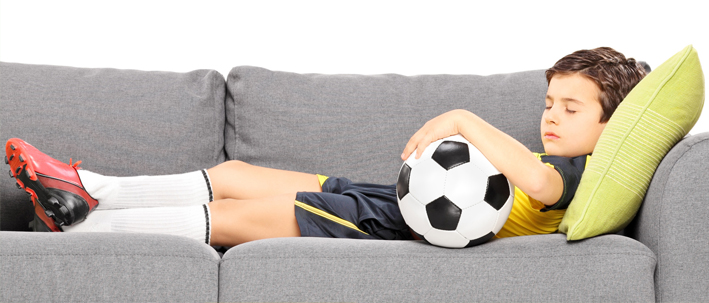
Better sleep: A great reason to get the ball rolling again
It’s a well-known fact that regular physical activity is good for overall health. Did you know that playing sports contributes to better sleep? Children and adults alike prove to be more tired in the evenings after a day of intense physical activity. People who have been physically active fall asleep more quickly and stay asleep for longer. Playing sports is also a great way to improve your sleep quality, by helping to regulate different sleep stages and cycles. The increase in sleep duration also leads to a more reparative sleep, allowing the brain and muscles to regenerate more completely.
Activity and sleep: A relationship explained through data
Using a panel of Withings Pulse users to better understand the relationship between sleep and exercise, we analyzed sleep profiles in two categories: nights after a day with physical activity and nights after a day without any physical activity.

We observed the following results:
1. Earlier bedtimes: After a day with physical activity, people were more tired and went to sleep an average of 36 minutes earlier (11:40 p.m. vs. 12:16 a.m.)
2. Increased sleep duration: The study revealed an extra 14 minutes in sleep duration when people participated in vigorous exercise during the day (6h48 vs 7h02).
3. Increased deep sleep duration: We noticed that most of the additional sleep time was occurring during deep sleep cycles. During periods of deep sleep, the body is able to repair both muscle and brain cells. Thus, this extra sleep is key in the cell reparation process. The average increase of deep sleep from this data was 19 minutes (3h20 vs 3h39).
4. Fewer wake-ups: In addition to having a positive effect on the duration of sleep, physical activity also helped people to sleep more soundly throughout the night. The average number of times people woke up in the middle of the night dropped 13% for people who were physically active during the day (1.3 times vs 1.5 times).
Maximize the benefits physical activity has on sleep
A regular workout schedule is important for improving sleep quality. Running or playing a sport for 30 minutes three times a week is better for sleep quality than working out once a week for an hour and a half. Some types of physical activities are better than others in helping you to achieve a better night’s sleep.
Endurance based workouts (running, walking, swimming, cycling) at a moderate intensity with a steady pace are the most optimal forms of physical activity.
Certain times of the day are better for physical activity than others. Playing sports in the morning or in the afternoon is preferable to the evening, especially adrenaline increasing activities. Activities that increase adrenaline levels, such as competition sports, will wake your body and make it more difficult to fall asleep.
Just as playing sports can have an impact on your sleep, the inverse is true as well. Not sleeping enough can lead to a lack of motivation to play sports. Even if you do force yourself to participate in physical activity while tired, your performance is likely to suffer due to sleep deprivation.
About the data analysis
This analysis was realized on a panel of more than 9,000 Withings Pulse users, between January and August 2014. Withings guarantees that no personal data was ever accessed to run this study and protects the life privacy of all its users. Every data used for this study are anonymized and aggregated.
Sleep data were analyzed for the days when people registered significant exercise durations :
– at least 20 minutes of intense activity
– or at least 1 hour of moderate + intense activity
– or at least 3 hours of light + moderate + intense activity
Information source: “Better Understand Sleep” from INSV (the French National Institute for Sleep)


